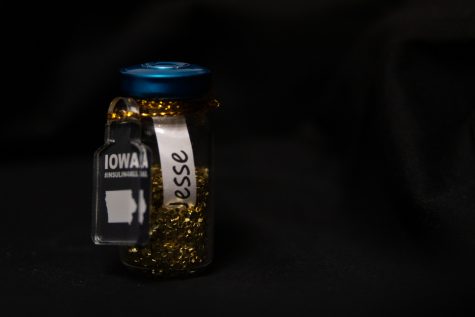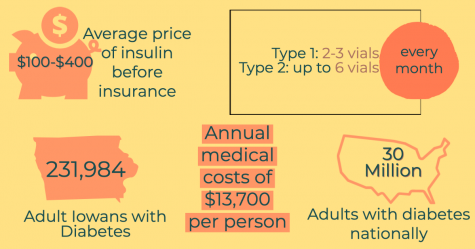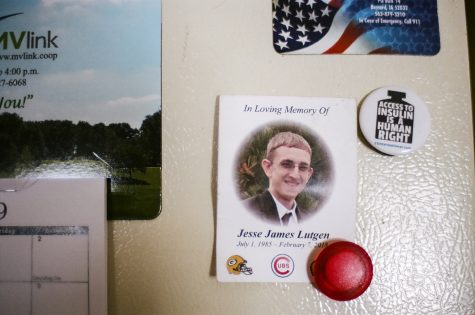Insulin prices remain high through the pandemic, Iowa lawmakers push for reform
Insulin prices have remained sky-high through the pandemic, and insulin-for-all advocate Janelle Lutgen is hopeful the Iowa Legislature will finally alleviate some barriers.
Janelle Lutgen poses for a portrait at Jimi B’s Bar and Grill in Bernard on March 14, 2021. Lutgen’s son Jesse died after financial struggle forced him to ration insulin. Now Lutgen works to provide free insulin to all.
Janelle Lutgen placed a miniature glass vial on the counter at Jimi B’s Bar and Grill, which was filled with gold glitter and a slip of paper with the name “Jesse” written on it. Lutgen’s son died four years ago after rationing his insulin, and to keep his spirit alive, Lutgen gifts these vials to political candidates running for office, including then-candidate Joe Biden.
“Last year at caucus time, we had everybody coming in,” she said in an interview last week at the northeast Iowa bar. “I had the gold vials, and I was able to give one to Joe Biden, Pete Buttigieg, Amy Klobuchar, Elizabeth Warren … But my idea was that if anyone was in a position where they could do anything, I was going to talk to them.”

Lutgen, a resident of Bernard, Iowa — a town with a population of 159 people — turned to the Iowa Legislature in 2018 to advocate for change after losing her son. Now, four years later, she is hopeful that a couple of key bills will finally make it through the finish line.
While state lawmakers can’t directly lower the price of prescription drugs, such as insulin, legislators are considering two bills that would remove some barriers for people trying to access the lifesaving medication.
Lutgen lost her 32-year-old son Jesse in 2018 after he rationed insulin used to treat his Type 1 diabetes. He lost his job and employer-provided health insurance and could no longer afford to properly treat his disease.
“I think part of the problem is that big pharma and the insurance industry have a big lobbying effort, and we have to try to break through that and have our politicians remember who they work for,” Lutgen said.
House File 262 would allow a pharmacist to fill a 30-day quantity of insulin without a prescriber’s authorization in an emergency situation, and House File 263 would cap co-pays for insulin prescriptions at $100. Both bills were approved unanimously by the Iowa House in February and were voted out of a Senate subcommittee on March 17.
For people with Type 1 diabetes, insulin is a lifesaving drug that needs to be taken regularly, or else a patient will die. It’s not a drug that allows wiggle room for skipping or rationing doses.
When you need insulin, you need insulin.
According to GoodRx, an American health care company that provides telemedicine services, the average sale price of insulin before insurance is anywhere between $100 and $400 per vial. The average Type 1 diabetic will use two to three vials of insulin per month. A Type 2 diabetic might use around six vials a month.

An analysis from PolitiFact Iowa found that discounts on insulin wildly vary from vendor to vendor, and business practices from pharmacy benefit managers, manufacturers, and health plans have played a key role in the rising costs.
There are some early projections and research studies that indicate the COVID-19 pandemic has increased the number of uninsured and underinsured Americans. A study from the Commonwealth Fund found that uninsured Americans are more likely to use older and less-effective brands of insulin because they are most affordable. According to the September 2020 study, 68 percent of uninsured Americans are more likely to pay the full price of insulin.
In 2019, a bill allowing a pharmacist to fill a 30-day quantity of insulin without a prescriber’s authorization passed the Iowa House but was not taken up in the Senate. Lutgen had been working with her area lawmakers to get that bill passed, but she said the COVID-19 pandemic uprooted any room for prescription drug reform in Iowa in 2020.

Current Iowa law allows for someone to receive a 72-hour quantity of prescription drugs without a prescriber’s authorization in an emergency, but that law does not extend to Epi Pens, inhalers, or insulin. Those drugs are packaged in much larger quantities and are not packaged in three-day doses.
State Sen. Liz Mathis, D-Hiawatha, said at a March 17 subcommittee hearing for the bill allowing emergency insulin refills that one of her neighbors supplied her son with a month’s worth of insulin before he went to college in Ames, but he left the insulin in his car overnight. It froze and became unusable.
“So, this [bill] would be beneficial in his case, that he would be able to go and say, ‘This is what happened’ … his mother wanted to rip his hair out, but other than that, he wasn’t able to get that extra prescription at the time,” Mathis said. “And I think this bill would cover something like that.”
State Rep. Steven Bradley, R-Cascade, introduced the emergency insulin bill this year in the House, and Rep. Tom Jeneary, R-Le Mars, introduced the bill that caps co-pay prices. During a Feb. 8 floor debate, both Republicans emphasized the bipartisan support these bills have received over the last few years and encouraged lawmakers to move them forward this year.
Aaron Todd, CEO of the Iowa Primary Care Association, said providing affordable insulin is one of the nonprofit association’s biggest jobs. The association operates 14 community health centers in Iowa, with the purpose of providing affordable health care to people in underserved communities. The association receives funding from both the state and federal sources.
Todd said a patient who qualifies for the 340B Drug program can get a vial of insulin for as low as $6. Patients qualify for the program if they regularly go to the facility and are at or below the poverty line.
The Iowa Legislature does not have the ability to pass legislation that would force pharmaceutical companies to lower the cost of drug prices. That reform has to come from the federal government.
Action on the federal level
In 2019, Sen. Chuck Grassley, R-Iowa, and Sen. Ron Wyden, D-Ore., launched an investigation into the rising prices of insulin. Grassley and Wyden, who both sit on the Senate Finance Committee, released their findings in January of this year, finding that competing insulin manufacturers will sometimes raise their prices in lockstep with other companies, sometimes within hours.
In 2019 committees in the U.S. House and Senate held hearings that featured testimony from some of the country’s leading insulin manufacturers, such as Eli Lilly, Novo Nordisk, and Sanofi. The companies claimed that they were not able to lower the price of prescription drugs like insulin because of how pharmacy benefit managers and health insurance companies operate.
Todd said Iowa’s Republican senators — Grassley and Joni Ernst — have been good allies to them in Congress, and that both have advocated for and sponsored legislation that would strengthen the 340B Drug program, along with other bills aimed at lowering prescription drug costs. But the pharmaceutical industry is one of the biggest lobbying industries in the country, Todd said, so it’s been a tough battle.
“We would love for people to know that the pharmaceutical industry is attacking one of the few affordable prescription drug programs that is working,” he said.
Ernst’s two siblings are insulin-dependent, and during a March 14 conference call with reporters, she said she hopes Congress will consider Grassley’s bipartisan bill that aims to lower prescription drug prices.
“I think it’s really important not only to keep the pharmaceutical companies in check, but also the pharmacy benefit managers, which are the middleman that oftentimes are the ones that are determining what drug or what cost should be passed on to the insurance companies and those consumers,” Ernst said.
Lutgen did not seek reelection for her position as the Republican Party chair in Jackson County, a position she held for five years. She said it was time for someone newer and younger to take over, and Lutgen said that she can now spend more time as an insulin-for-all advocate.

She voted for former President Donald Trump in 2016, and when she did an interview with The Daily Iowan in 2019, she said she was proud to say that Trump had pledged to lower prescription drug prices in his 2019 State of the Union Address.
Now, in 2021, Lutgen is disappointed with the inflammatory language some Republicans use online, along with the fact that more headway hadn’t been made in Congress in lowering prescription drug prices.
She said that, while she voted for Trump again in 2020, she’s often had to remind herself why she’s a Republican — being pro-life is extremely important to her — but she said that she has lost some trust in the government.
“I had to do a little soul searching, and on Facebook I just started snoozing people — I don’t want to hear it,” she said, referring to how she would unfollow people on Facebook to avoid seeing their posts.
Lutgen said that there’s been instances where she’s corrected people who claim that Biden has raised insulin prices. She also said she received some flak from fellow Republican Party members when she was meeting with Democratic presidential candidates leading up to the 2020 general election.
Lutgen says that while the U.S. experiences a divisive time in politics, she wants to work with lawmakers who she thinks will be able to make a difference, whether they are a Republican or Democrat. She also said that she wants lawmakers to be able to trust that she’s giving them factual information when she lobbies for insulin-for-all legislation.
“I’m a Republican, but truth is the truth. I can’t advocate for my cause based on lies,” she said. “Because I feel like when I talk to a legislator, they have to trust me that I’m going to tell them the facts.”



